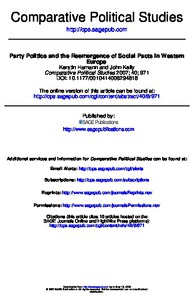Party politics and the reemergence of social pacts in Western Europe

"Conventional accounts of the reemergence of social pacts in Western Europeargue they are a governmental response to economic pressures, in particularthe requirements for joining the European Monetary Union (EMU). Theauthors analyze three case studies-the Netherlands, Ireland, and Austria-to illustrate the usefulness of an alternative explanation centering on electoralcalculations by political parties in choosing pacts. Parties forge social pactsnot only to deal with economic problems but also when they perceive themto be helpful in reducing the potential electoral costs of economic adjustmentand wage policies. Alternatively, parties may forgo negotiations with socialpartners for electoral gain. The authors extend the analysis to sevenadditional countries to apply the analysis more broadly. By combining theseparate literatures on political economy and party politics, they are able toshed new light on the dynamics of social pacts in Western Europe."
Digital
The ETUI is co-funded by the European Union. Views and opinions expressed are however those of the author(s) only and do not necessarily reflect those of the European Union or the ETUI.